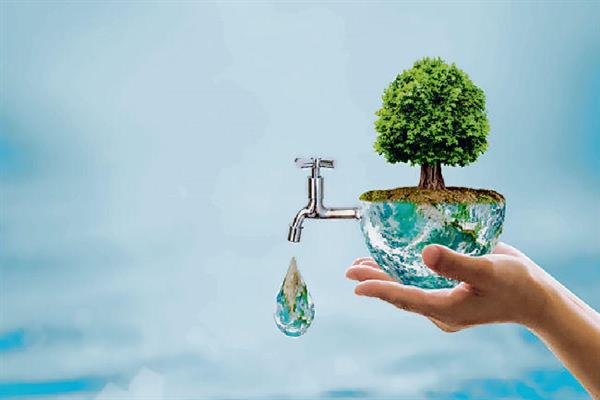Excelsior Correspondent
India, on its journey towards development, has embarked on a mission to ensure the last person in the queue benefits from government schemes. The Viksit Bharat Sankalp Yatra is currently traversing the Union Territory of Jammu and Kashmir (UT of JK), with a primary objective of saturating government schemes. The overarching goal is to provide the fruits of these initiatives to every citizen, particularly those at the grassroots level.
The Yatra has witnessed significant public participation, reflecting the collective commitment to making India a developed nation by 2047.
Jammu and Kashmir, as an integral part of this endeavor, has made substantial progress in the last four years, especially in providing water connections to both hilly and plain areas.
As of 2019, approximately 7.82 lakh households in JK had water connections. However, in the past four years, the government’s concerted efforts in this sector have propelled the number to an impressive 14 lakh households, signifying a remarkable increase. This achievement is a crucial milestone in the journey toward achieving the goals set by the ambitious Jal Jeevan Mission.
One notable success story is the Water Supply Scheme (WSS) in Hergawas, falling within the jurisdiction of the PHE Sub Division Doru Division, Qazigund Block. This scheme caters to two villages, Gamdooru and Hergawas, predominantly inhabited by the Scheduled Tribe (ST) population. Serving 134 households with a total population of 2158 individuals, the project, implemented with a budget of Rs. 47.0 lakhs, stands as a testament to the mission’s commitment to reaching remote areas.
In far-off places along the Line of Control (LoC), dreams have come true for villagers as drinking water through pipes has become a reality under the flagship ‘Jal Jeevan Mission.’ Villagers, especially women, express their joy and gratitude for the transformation in their lives. The availability of water pipes in these areas has significantly eased daily life, marking a historic change.
The village of Baltan, located in the Kupwara district, has also experienced the positive impact of the Jal Jeevan Mission. The scheme has reached remote areas like Batlan, bringing clean tap water to the residents and ending a 50-year wait for the people of Nilphan Top Village in Larnoo, Anantnag.
Nazia from Budgam shared her story during an interaction with the Prime Minister as part of the Viksit Bharat Abhiyan. Before 2019, she, like thousands of families in JK, had to travel miles to fetch water for daily use. The provision of water connections has not only made their lives easier but also allowed them to utilize their time more productively.
The recent milestone of crossing 75% coverage under the Jal Jeevan Mission in Jammu and Kashmir is a cause for celebration. Out of a total of 18,69,821 rural households, the UT is now providing clean tap water to 14,02,693 rural households. This significant achievement showcases the commitment of the government to ensure access to safe and adequate drinking water for its citizens.
The success stories from various villages highlight the transformative impact of the Jal Jeevan Mission. In Hergawas, the rhythmic flow of tap water brings joy to every home, particularly among the ST population. Similarly, in Batlan and Nilphan Top Village, the availability of piped water is celebrated as a blessing that has transformed lives.
The government’s continuous efforts are evident in the recent approval of 102 new Water Supply Schemes worth Rs 476.71 crore. This move aims to cover an additional 54,752 rural households in the UT, ensuring that no household is left without a tap connection within its premises. The identification of these areas was done through public outreach programs, emphasizing the participatory nature of the Jal Jeevan Mission.
The involvement of various stakeholders, including the Central Government’s Department of Drinking Water & Sanitation, Jal Shakti Department, J&K, District Administrations, and local communities, underscores the collaborative approach to achieving the mission’s objectives. Pani Samitis, representing local communities, play a critical role in planning, implementing, and monitoring mission activities.
Officials directed to expedite the execution of these schemes, emphasizing transparency, accountability, and accessibility. As of now, J&K has achieved more than 75% coverage of tap water connections, earning the ‘High Achievers’ category at the national level.
With about 3300 schemes planned under the Jal Jeevan Mission at an estimated cost of Rs. 12,975.00 crore, the UT is making significant strides in providing access to safe drinking water. The completion and commissioning of Water Supply schemes in various districts have brought relief to thousands of households, replacing water sources that were previously of questionable quality.
The introduction of the Har Ghar Jal Certification process by Gram Panchayats ensures transparency and community ownership. Villages reported as Har Ghar Jal by the PHE Department are certified through a Special Gram Sabha resolution, creating awareness and promoting the importance of tap water connectivity.
In conclusion, the journey of Jammu and Kashmir under the Jal Jeevan Mission is a remarkable story of progress and transformation. The commitment to reaching the last person in the queue is evident in the continuous efforts to expand water supply schemes, provide tap connections, and improve the quality of life for citizens across the UT. As the mission progresses, the collective efforts of the government and local communities are shaping a future where access to clean and safe drinking water is a reality for every household in Jammu and Kashmir.


